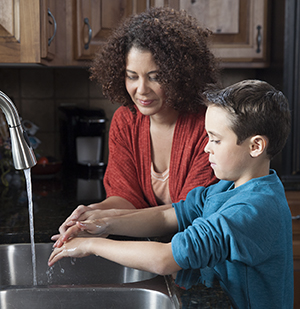The Dangers of Lead Poisoning
Lead is a metal. It was once used in things like paint, china, gasoline, and water pipes. Too much lead can make you, your children, and even your pets sick. Breathing, touching, or eating paint or dust containing lead is the most likely way of being exposed. Dust gets on the hands. It can then enter the mouth, especially in young children who often put objects in their mouth. Children may also chew on lead paint because it can taste sweet.
Lead hurts kids
-
Sometimes you may not notice any signs of lead poisoning in children.
-
Behavior, learning, and sleep problems may be caused by lead. These can include lower levels of intelligence and higher levels of attention-deficit hyperactivity disorder).
-
Other signs of lead poisoning include clumsiness, weakness, headaches, and hearing problems. It can also cause slow growth, stomach problems, seizures, and coma.
Lead hurts adults
-
People who work in certain professions are at risk for lead exposure. These include workers in battery factories, shooting ranges, cosmetics workers, and recyclers. Lead can cause problems with blood pressure and muscles. It can hurt your kidneys, nerves, and stomach.
-
It can make you unable to have children. This is true for both men and women. Lead can also cause problems during pregnancy.
-
Lead can impair your memory and concentration.
Reduce the danger of lead

-
Have your home's water tested for lead. If it is found to be high in lead content, follow directions provided by the CDC. These include using only cold water to drink or cook and letting the cold water run for at least 2 minutes before using it.
-
If your home was built before 1978, you should assume it contains lead paint unless you have proof to the contrary. In this case, the tips below can reduce your and your children's exposure to lead.
-
Keep house surfaces clean. Wash floors, window wells, frames, sills, and play areas weekly.
-
Wash toys often. Don’t let your children lick or chew painted surfaces. Don’t let your children eat snow.
-
Wash children’s hands before they eat. Also wash them before they take a nap and go to sleep at night.
-
Feed your children healthy meals. These include meals high in calcium and iron. Children who have a healthy diet don’t take in as much lead.
-
If you notice paint chips, clean them up right away.
-
Try not to be onsite through major remodeling projects on your home unless the area under construction is well sealed off from your living and children's play areas.
-
Check sleeping areas for chipped paint or signs of chewed-on paint.
-
Remove vinyl miniblinds if made outside the U.S. before 1997.
-
Don’t remove leaded paint. Paint or wallpaper over it. Or ask your local health or safety department for a list of people who can safely remove it.
-
Be aware of toy recalls due to lead paint. Sign up for recall alerts at the U.S. Consumer Product Safety Commission website at www.cpsc.gov.
Online Medical Reviewer:
Amy Finke RN BSN
Online Medical Reviewer:
L Renee Watson MSN RN
Online Medical Reviewer:
Robert Hurd MD
Date Last Reviewed:
12/1/2022
© 2000-2024 The StayWell Company, LLC. All rights reserved. This information is not intended as a substitute for professional medical care. Always follow your healthcare professional's instructions.